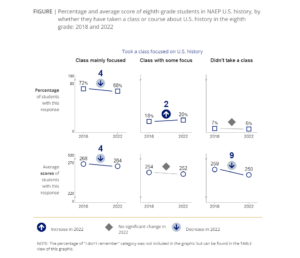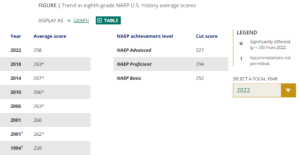U.S. History and Civics Education: Lacking Standards, Little Knowledge
According to the Every Student Succeeds Act (ESSA) of 2015, which effectively replaced the more rigid Bush-era No Child Left Behind (NCLB) policy, each state has its own flexible framework for ensuring the accountability of schools. In the aftermath of the controversial Common Core State Standards, the ESSA barred the federal government from trying to influence the states’ decisions as to what their “challenging” standards in math, science, and reading should be. Also, ESSA differs from NCLB in that it does not require proficiency in both math and reading.
One thing the laws have in common is that both are missing standards for history and civics. Years of inattention to history and civics have taken a toll during the recent period of political strife, as far too many young people lack the knowledge needed to be a functional citizen or to recognize undemocratic actions by those in power. The lack of emphasis on history and civics education has led to a decrease in the number of students taking courses pertaining to the subject, with the percentage of eighth graders taking a “class mainly focused” on U.S. history declined from 72 percent in 2018 to 68 percent in 2022.

Fig. 1. Source: NAEP.
As a result, U.S. history test scores among eighth graders are experiencing a decade-long decline. In 2001, according to Mass Report Cards, 93 percent of students attending charter public schools and 88 percent of students attending traditional public schools in Massachusetts were scoring either in the Needs Improvement or Warning/Failing categories for history.
Following a period of rising U.S. history scores on the National Assessment of Educational Progress (NAEP), a deep slide has taken hold. Since 1994, the national average of every subsequent cohort of eighth graders has failed to exceed the minimum requirement for “proficient” U.S. history knowledge, with the 2022 cohort scoring an average of 258 out of 500 possible points on the test. The average student’s knowledge of U.S. history is basic rather than proficient or advanced.

Fig. 2. Source: NAEP. Note: There was a statistically significant drop in average student performance on the NAEP U.S. history test among eighth graders in 2022 compared to the four test years prior.
Similarly, average scores among eighth graders taking the NAEP Civics test have never risen to the “proficient” level. In 2022, the average score was 150 out of a possible 300.
The effects of the lack of U.S. history and civics education are glaring even among those who are out of school. A 2018 survey conducted by the Institute for Citizens and Scholars found that only one in three Americans could pass a U.S. Citizenship test, which requires six or more out of every ten questions to be correct. Of the respondents, merely 24 percent were able to correctly identify the reason why the colonists fought the British. Americans largely lack a fundamental understanding of the country’s founding, never mind its history since, and it is time to rectify that for the benefit of all our futures.
Given the sub-par performance of American eighth graders on their NAEP U.S. History and Civics tests and the vast failure of respondents on the Citizenship Test survey, it is time to emphasize the importance of educating students in these often interconnected subjects. Students are not effectively taught about their country’s history, or how to appropriately impact its future. In a time when the method of teaching history is becoming a highly politicized subject, it is important that we do not stray from teaching or learning history and civics in pursuit of comfort, and instead bolster efforts to improve students’ knowledge on these subjects.
About the Author: Sarah Delano is a Roger Perry Government Transparency Intern at the Pioneer Institute for the summer of 2023. She is a senior studying Political Science at the University of Massachusetts-Amherst.



